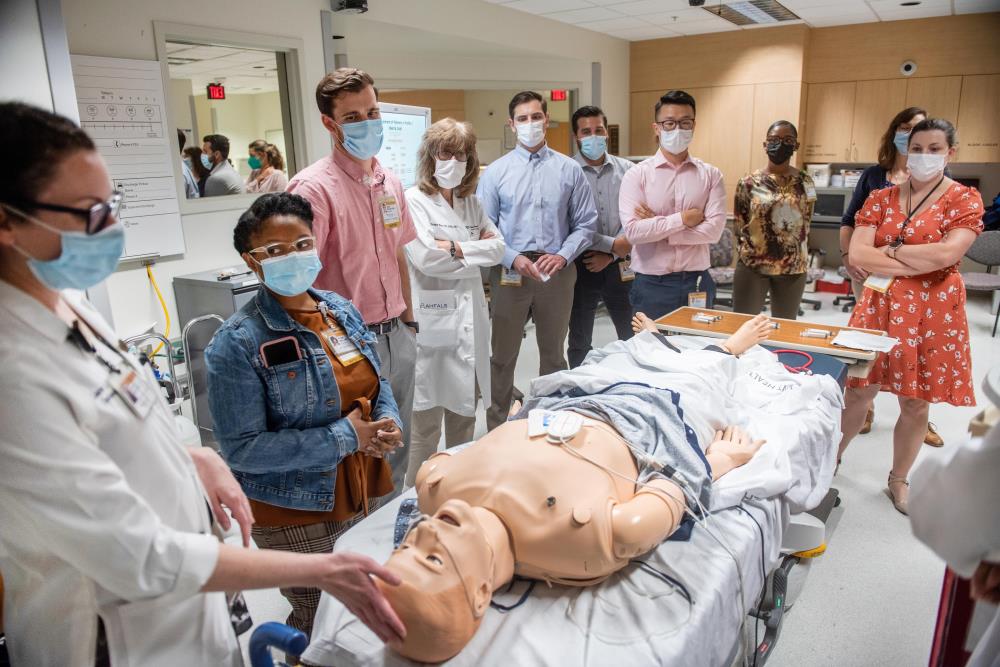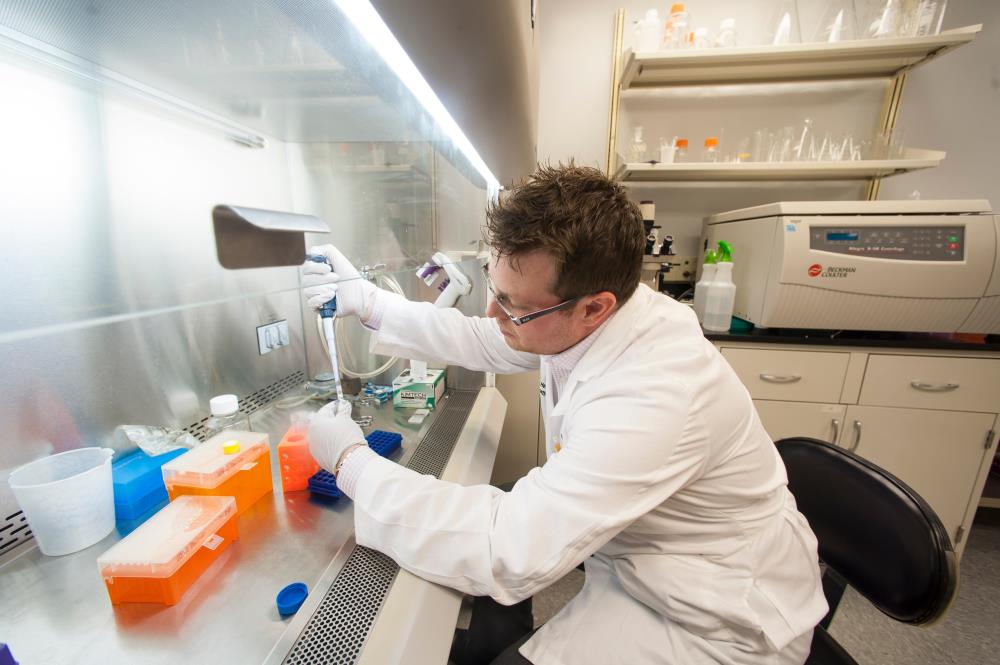 In the evolving world of health care, Atrium Health Wake Forest Baptist is well positioned to fill a specific leading role: the academic core of a thriving academic learning health system.
In the evolving world of health care, Atrium Health Wake Forest Baptist is well positioned to fill a specific leading role: the academic core of a thriving academic learning health system.
Atrium Health’s enterprise now includes the Atrium Health Wake Forest Baptist region and two regions based in Georgia — Atrium Health Navicent in Macon and Atrium Health Floyd in Rome. That growth has made Atrium Health one of the largest integrated, nonprofit health care systems in the Southeast, with 40 hospitals and more than 1,400 care locations.
Having committed to following the academic learning health system model, Wake Forest Baptist and the Wake Forest University School of Medicine are poised to apply that model across Atrium Health and serve as the enterprise’s academic core. The model builds on the traditional academic medical center model in a number of important ways and fully capitalizes on the unique resources that medical schools offer.
“An academic medical center is simply a medical center where training and research take place,” explains Kevin High, MD, president of the Atrium Health Wake Forest Baptist system. “That doesn’t mean the health system data information and culture integrate with the academic data information and culture. In fact, those often exist separately side by side with deliberate walls built between them.
“In an academic learning health system, we want to embed the academic system within the larger health system so that there are no walls and it’s very transparent.” said High
Terry Hales, the Wake Forest University School of Medicine’s executive vice chief academic officer for administration, says he believes the academic learning health system being developed within Atrium Health will soon become a model for other academic medical centers nationally.
“We desire the academic medical center to be a term of the past,” Hales says. “The picture of an academic learning health system would not be two silos — academics and a health system — but one construct where the core heartbeat is your academic enterprise, and we interact in a way that creates this perpetual circle of engagement where the insight gained is used for research and is more immediately applied in the health system.”
Academic Learning Health Systems Defined
Academic learning health systems apply the data and evidence they are generating to optimize patient care, population health, health system operations and the education and training of the next generation of health care practitioners. “In all of our myriad endeavors, we strive for an atmosphere of constant collaboration, while collectively getting better every day in every way, whether it’s providing world-class care to our patients, delivering high-level education to our students or collecting outstanding scientific information in our research activities,” says Julie Ann Freischlag, MD, FACS, FRCSEd(Hon), DFSVS, chief executive officer of Atrium Health Wake Forest Baptist, dean of the Wake Forest University School of Medicine and chief academic officer of Atrium Health. “Our many stakeholders understand that those are all integral elements of our academic learning health system.”
According to High, academic learning health systems follow a PDSA cycle — Plan, Do, Study and Act. You plan something, do it, study the outcomes and act on that change in a continuous cycle of improvement.
“Sometimes that cycle spins off research questions that take much longer than the typical quality improvement cycle but are really important questions to ask,” High says. “An academic learning health system can spin off those academic questions that are really important not just for our health system but for the entire field of medicine to study and to learn from. We can become leaders in those areas of academics as well.”
An academic learning health system also engages the entire research enterprise, including informatics and basic science faculty.
“Applying our advanced informatics and analytic capabilities, we can determine which of our patients fare best with a certain treatment,” says Freischlag. “Knowing this can provide insights on the genetic or metabolic factors that underlie a given disease — observations that can then be taken back to the lab to further study.”
With the Wake Forest University School of Medicine, Atrium Health Wake Forest Baptist is uniquely positioned to excel as an academic learning health system. For example, High says the school has one of the world’s only departments of implementation science. When data generated from patient care indicate that some aspect of care can be improved, implementation science helps find the best way to make that change systemwide. It could be adding a reminder to the patient electronic medical record, putting a protocol in place for approvals before a certain drug is administered or designing a new care model.
“It’s a process of purposefully putting at the heartbeat of a health system this academic enterprise that is doing basic research but also research that is uniquely focused on improving care and positioning the data and information to flow freely,” Hales says. “When we do that, it becomes a tide that lifts all. It joins all aspects of the enterprise together in a really powerful way.”

Benefits for Communities
The combination of Atrium Health, Wake Forest Baptist and the Wake Forest University School of Medicine has produced new opportunities to implement innovations and a wider network of patient populations that could benefit from taking part in clinical research.
“When you now serve 7 to 8 million people at 40-plus hospitals and thousands of clinical locations, that is a scale that allows you to answer questions much quicker, implement different solutions in different places where those are appropriate and compare them much more rapidly,” High says.
As care increasingly is delivered in the community outside of the traditional academic medical center, he sees wide-ranging benefits for communities served by an academic learning health system. As an example, he cites the Implementation of Guidelines for Lowering Blood Pressure (IGLOO) study, led by Wake Forest Baptist researchers. Results of the study led to changes at individual clinics, where a new blood pressure measurement protocol has been put into place to help prevent strokes and cardiovascular events.
“That brings research directly into the community at distributed sites, not just within the academic medical setting,” High says. “That has enormous impact on health equity, for instance, because you can more efficiently bring academic resources and know-how to communities of color and to underserved communities. It gives us the ability to work with community groups on a much larger scale and mitigate the impact of social determinants of health.”
Impact on Education

The academic learning health system also impacts education, which goes well beyond training physicians. At the Wake Forest University School of Medicine, it includes PAs, nurse anesthetists, pastoral care specialists and medical researchers trained through graduate programs in the biomedical sciences. Curricula across all programs are designed to prepare all students to work in an academic learning health system environment.
“It means we talk about things like implementation science and make education not just about treating the disease and the care of an individual but give a greater context about the larger implications for population health,” Hales says. “Our educators who are engaging with our learners are now bringing a more holistic view into the learning environment as they teach, as opposed to just talking about one subject. It begins to influence the whole learning environment.”
That environment also extends beyond formal, tuition-paying learners. “All of our staff and all of our teammates become part of this culture of perpetual learning,” Hales says. “This model allows you to activate and change culture across your entire enterprise.”
Evolving Into the Future

By design, the work of an academic learning health system is a journey, a process of continually seeking new ways to integrate advances in care.
“An academic learning health system should be the choice of research funding agencies and pharmaceutical companies and others who want to develop solutions in the real world, and not take 17 years to get from concept through approval to trying to then embed that advancement into routine care and then sometimes finding out that you can’t really embed it in routine care,” High says. “That happens all the time with complex issues like Alzheimer’s care, caregiver support or trying to address health disparities with people who can’t always get a ride where they need to go. We have to embed it in the real world. That’s what the evolution of an academic learning health system will be, to increasingly embed academics into the real world of care.”
It is a process that never ends. It will keep Wake Forest Baptist at the heart of Atrium Health’s academic learning health system.
“We are never fully there, we’re never done,” Hales says. “We’re in a perpetual state of evolvement and improvement, and that’s where we want to be.”
